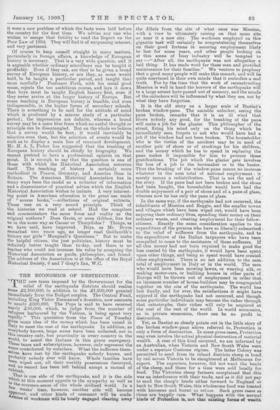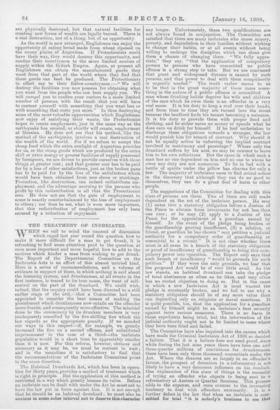THE ECONOMICS OF DESTRUCTION. -T HE new taxes imposed by the
Government for the relief of the earthquake districts should realise .sonie £2,500,000, in addition to the £1,200,000 granted 1.roinediately from the Budget surplus. The Central Fund, including King Victor Eininanuel's donation, now amounts to nearly £300,000. The Pope is said to have received nearly £30,000, which, to judge from the number of refugees harboured by the Vatican, is being spent very Picliy." This quotation from the Times of Tuesday Rives some idea of the money which has been raised in Italy to meet the cost of the earthquake. In addition, as everybody knows, large sums have been collected, not in this country.only, but practically in every country in the world, to assist the Italians in this grave emergency. These taxes and subscriptions, however, only represent the "ins contributed by outsiders. What the sufferers them- 8elve8 have lost by the earthquake nobody knows, and erobably nobody ever will know. Whole families have • en wiped out, all their worldly possessions destroyed, 41'd no record has been left behind except a mound of rubbish. That is one side of the earthquake, and it is the side h at this moment appeals to the sympathy as well as ▪ the common-sense of the whole civilised world. In a neW weeks' time, however, another side will become -AlVii.rent, and other kinds of comment will be made. 441111e5 of workmen will be busily engaged clearing away the ddbris from the site of what once was Messina, with a view to ultimately raising on that same site or near it a new city. The workmen employed on this gigantic task will certainly be congratulating themselves on their good fortune in securing employment likely to last for some years, and other people looking on at this scene of busy industry will be tempted to say :—" After all, the earthquake was not altogether a bad thing. It has made work for these men and provided maintenance for their families." We venture to prophesy that a good many people will make this remark, and will be quite convinced in their own minds that it embodies a peal truth. For by the time that the work of reconstructing Messina is well in hand the horrors of the earthquake will to a large extent have passed out of memory, and the minds of the onlookers will be influenced by what they see, not by what they have forgotten.
It is the old story on a larger scale of Bastiat's broken window-pane. The amiable onlooker, seeing the pane broken, remarks that it is an ill wind that blows nobody any good, for the breaking of the pane will make a job for the glazier. This philosopher of the street, fixing his mind only on the thing which he immediately sees, forgets to ask who would have had a job if the window had not been broken. The householder. who is the victim of the accident may be in need of . another pair of shoes or of stockings for his children, and the money which he has to spend in replacing the pane makes it impossible for him to procure these gratifications. The job which the glazier gets involves the loss of a job to the bootinaker or to the bother. Thus the breaking of the window-pane means no increase whatever in the sum total of national employment : it merely means a redistribution. That is not the end of the story. If the pane had not been broken and. the shoes had been bought, the householder would have had the double enjoyment of a pair of shoes and of a pane of glass, whereas now he has only the pane ef glass.
In the same way, if the earthquake had not occurred, the inhabitants of Messina and Reggio, and the smaller towns and villages which have been wiped out, would have been enjoying their ordinary lives, spending their money on their ordinary wants, and creating employment for their fellow- citizens. Exactly the same consideration applies to the expenditure of the persons who have so liberally subscribed to the relief of sufferers from the earthquake, and to the expenditure of the Italian taxpayers who have been compelled to come to the assistance of these sufferers. If all this money had not been required to make good the loss created by the earthquake, it would have been spent upon other things, and being so spent would have created other employment. There is no net addition to the sum total of employment in Italy or in the world. The men who would have been mowing lawns, or weaving silk, or . making motor-cars, or building houses in other parts of Europe will be thrown out of employment in order that . an immense number of house-builders may be congregated together on the site of the earthquake. The world has lost finally, and for ever, the satisfactions it might have enjoyed if the earthquake had not occurred, and though some particular individuals may become the richer through that catastrophe, their riches will only be acquired at the cost of the rest of the world. In world economics, as in private economics, there can be no profit in destruction.
Yet, as Bastiat so clearly points out in the little story of the broken window-pane above referred to, Protection is only a form of destruction. In some gross cases, Protection may even involve the actual physical destruction of material wealth. A case of this kind occurred, we are informed by an Australian, when Victoria and New South Wales were under a separate Customs rdgiine. The latter Colony was permitted to send from its inland districts sheep in bond by rail across Victoria to be slaughtered at Melbourne for export. The exporters, however, did not want the heads of the sheep, and these for a time were sold locally for food. The Victorian sheep farmers complained that this was an interference with their trade, and as it did not pay to send the sheep's heads either forward to England or back to New South Wales, this wholesome food was treated with kerosene and burnt as rause,. Such gross oases as these are happily rare. What happens with the normal kinds of Protection is, not that existing forms of wealth are physically destroyed, but that natural facilities for creating new forms of wealth are legally barred. There is a real destruction, not of a thing, but of an opportunity.
As the world is now arranged, Englishmen can enjoy the opportunity of eating bread made from wheat ripened on the sunny plains of Argentina. If Protectionists could have their way, they would destroy this opportunity, and confine their countrymen to the more limited sources of supply within the British Empire. Again, at present all Englishmen can obtain the manufactured goods they want from that part of the world where they find that these goods can best be produced. The Protectionists in effect say to their fellow-countrymen :—" We will destroy the facilities you now possess for obtaining what you went from the people who can best supply you. We will compel you to confine your custom to a more limited number of persons, with the result that you will have to content yourself with something that you want less or with something that costs you more." Iu thus destroying some of the most valuable opportunities which Englishmen now enjoy of satisfying their wants, the Protectionist hopes to create employment, just in the same way as the earthquake has created, or shortly will create, employment at Messina. He does not see that his method, like the method of the earthquake, involves a real destruction of the wealth of the world. For if we refuse to accept the cheap food which the extra sunlight of Argentina provides for us, or the cheap goods which are produced by the extra skill or extra energy or greater facilities of supply possessed by foreigners, we are driven to provide ourselves with these things at greater cost ; and that greater cost has to be paid for by a loss of other satisfactions, just as the broken pane has to be paid for by the loss of the satisfaction which would have been obtained from new shoes or stockings. Protection, like destruction, can indeed redistribute em- ployment, and the advantage accruing to the persons who profit by this redistribution is all that the Protectionist sees. He does not see that the gain of employment to some is exactly counterbalanced by the loss of employment to others ; nor does he see, what is even more important, that this redistribution of employment has only been secured by a reduction of enjoyment.





































 Previous page
Previous page